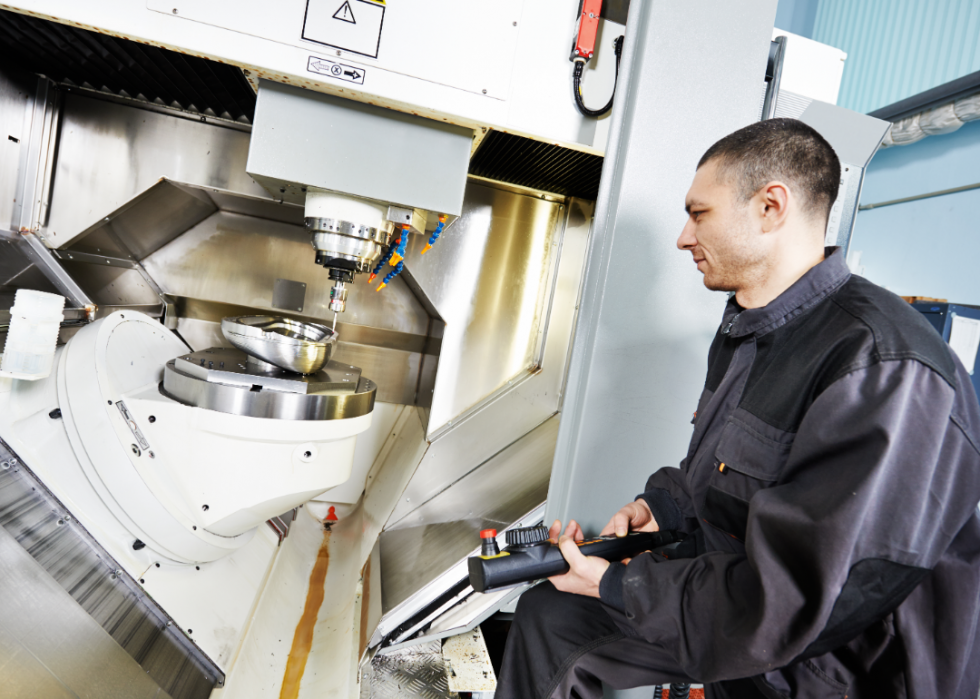
2-year degrees that can earn you the most money
It's no secret that the cost of college in America is skyrocketing. According to a July 2025 Bankrate report, four-year public universities cost out-of-state students $30,780 annually. Add in expenses like housing, transportation, and other supplies, and that number goes up to $49,080. That's to say nothing of private institutions, where—with those extra expenses included—students could be looking at $62,990 annually.
Think that's a lot? Elite institutions are even worse, and as the Class of 2029 is learning, costs continue to rise. The University of Pennsylvania, for example, raised undergraduate tuition by 3.7% for the 2025-2026 academic year, bumping up the total cost to $91,112. Duke University increased tuition by an even more daunting 5.93%, resulting in a $92,042 price tag. Sticker shock feels like an understatement.
These numbers make it easy to see why a four-year college degree is simply out of the question for many Americans. High school graduates are unwilling to take on the lifetime of debt the degree would bring, or lack the resources to attend public or private universities without taking out loans. It's perhaps not surprising that in a November 2025 poll from NBC News, two-thirds of respondents said they no longer see four-year degrees as worth it.
Luckily, a four-year degree isn't the only higher education option. Plenty of colleges offer two-year programs at a much more affordable rate. While associate degrees don't improve earning prospects as much as bachelor's degrees, they still increase job stability and wages.
In the following slides, Stacker has compiled a list of the associate degrees that earn the most money, using data from PayScale. Degrees are ranked by mid-career pay (as of 2021). So before you commit to a four-year program, read on to discover your other, cheaper options.

#100. Engineering technology
- Early career pay: $44,700
- Mid-career pay: $67,100
There's a decent amount of overlap between engineering and engineering technology, but what ultimately separates them is that engineering focuses more on the conceptual side of things. In contrast, engineering technology focuses on the practical application of said concepts. The line of study requires a strong grasp of math and the sciences. Upon graduation, students can find work as product testers, in design, or as technicians in manufacturing engineering, product engineering, and field engineering.

#97. Information technology (tie)
- Early career pay: $42,100
- Mid-career pay: $67,200
A field with a wide scope, information technology often sounds more complicated than it is. Essentially, it's the study of the design and implementation of technologies (like computers) for storing, retrieving, and sending information. Careers that fall under this umbrella include things like web development, computer programming, and cybersecurity.

#97. Electronics engineering technology (tie)
- Early career pay: $45,900
- Mid-career pay: $67,200
Electronics engineering technology is concerned with designing, manufacturing, and testing the various electronics that surround us in the modern world, from televisions to smartphones. The clearest career path for those with a two-year degree in the subject is an electronics engineering technician. In this role, they'd assist those with more advanced degrees in conceptualizing, building, and refining new technologies.

#97. Biomedical equipment technology (tie)
- Early career pay: $45,200
- Mid-career pay: $67,200
A two-year biomedical equipment technology program equips students with the necessary skills to repair and maintain a variety of medical devices, including heart monitors, respiratory therapy devices, defibrillators, and medical imaging equipment. While the most obvious post-graduation jobs include biomedical equipment technicians and biomedical equipment specialists, some students choose to find employment in other medical industry areas, including medical sales or equipment trainers for doctors and nurses.

#96. Technical studies
- Early career pay: $43,900
- Mid-career pay: $67,700
Unlike many of the other entries on this list, technical studies doesn't necessarily refer to one specific discipline like engineering or computer sciences. Instead, it's a more broad term that refers to the hands-on and practical aspects of various fields. That being said, a graduate who holds a degree in technical studies could go on to be anything from a welder to a computer repairman to a mechanical technician. Because many students are now choosing degree programs that focus on the more theoretical side of a field, students who hold these vocational degrees are in higher demand and can command a larger salary.

#94. Network security (tie)
- Early career pay: $45,100
- Mid-career pay: $67,800
With so much of our lives spent online, our personal information, internet connections, and identities must be as secure as possible. Providing this cyberprotection is the main job of professionals with a network security degree. While in school, these individuals learn to do things like design security protocols and repair potential security breaches, before stepping into positions like network administrators or cybersecurity specialists.

#94. Electrical construction and maintenance (tie)
- Early career pay: $47,100
- Mid-career pay: $67,800
For the average person, planning and installing a home electrical system is a task way outside of their wheelhouse. This is why we turn to those who hold an associate degree or higher in electrical construction and maintenance to do the work for us. These individuals, who most often work as electricians, are trained in the mathematical concepts necessary to plan out a safe, working electrical system, and the technical principles needed to install it.

#93. Industrial electronic technology
- Early career pay: $45,300
- Mid-career pay: $68,000
The first of many similar areas of study on this list, industrial electronic technology focuses on the installation, operation, maintenance, and repair of electronic or electrical equipment that is used in industry and manufacturing. Individuals who obtain a two-year degree in this field can often be found working as repairmen for commercial and industrial equipment or as semiconductor processors. The field is an excellent choice for those who enjoy putting things together and work well with their hands.

#92. Civil engineering technology
- Early career pay: $41,500
- Mid-career pay: $68,100
Civil engineering technology focuses on the construction of public works like bridges, highways, and sewer systems. The work requires strong math skills, and many programs require a placement exam before admitting students. Careers for those who hold a civil engineering associate degree include cartography, land surveying, and CAD operator.

#90. Manufacturing engineering technology (tie)
- Early career pay: $46,000
- Mid-career pay: $68,200
Potential job titles for students who hold an associate degree in manufacturing engineering technology include assistant industrial or manufacturing engineer, quality or industrial engineering technician, and estimator. The course of study focuses on making manufacturing processes more effective: faster, better, and less expensive.

#90. Electronics and computer technology (tie)
- Early career pay: $41,400
- Mid-career pay: $68,200
Electronics and computer technology students spend their time in school learning how to build and repair physical devices (like a laptop computer), the basics of creating an operating system, and the fundamentals of both local area networks and wide area networks. Upon graduation, they are equipped to build, maintain, and repair a network system at any level—an increasingly important job as computer technology continues to advance, and we become more reliant on it. Typical jobs post-graduation include computer or office machine repair specialist, computer support specialist, or electronics technician.

#89. Industrial engineering technology
- Early career pay: $48,900
- Mid-career pay: $68,300
The primary goal of industrial engineers is to make a single industry and the individual workers within that industry as productive as possible. To do this, they employ their problem-solving skills to design, develop, and implement systems for government agencies, consulting firms, and individual businesses. Henry Ford, often considered the father of the modern assembly line, is one example of an industrial engineer.

#88. Computer engineering
- Early career pay: $43,000
- Mid-career pay: $68,500
Computer engineering combines electronic engineering with computer science to create the physical devices we use for computing and the software we run on said devices. A two-year computer engineering degree can lead to careers developing software and hardware or repairing preexisting hardware. Famous computer engineers who've made a fortune off of this line of study include Steve Wozniak of Apple and Bill Gates of Microsoft.

#87. Robotics
- Early career pay: $50,300
- Mid-career pay: $68,800
Those with an associate degree in robotics will learn the general concepts behind installing, troubleshooting, operating, and testing robotic systems. These programs provide plenty of hands-on training to equip graduates for jobs as robotics technicians in fields as varied as construction, defense, medicine, and aerospace.

#85. Microcomputer and network technology (tie)
- Early career pay: $50,400
- Mid-career pay: $68,900
With so much of the world dependent on computers, it's more important than ever before that our computer networks are installed, maintained, optimized, and protected correctly. This demand has led to an increase in the need for properly trained microcomputer and network technicians. Learners who pursue a two-year degree in this field can easily find work as technical or network support specialists for private businesses, health care companies, and government agencies among other things.

#85. Data processing (tie)
- Early career pay: $35,000
- Mid-career pay: $68,900
A subset of information processing, data processing entails manipulating raw data so that it can provide meaningful information to a company. Students will study topics like database management, spreadsheet application, and programming basics in this computer-based degree. While these professionals play an important role in business and government, it is important to note that, according to the U.S. Bureau of Labor Statistics, career opportunities are projected to shrink over the next six years, especially for those who don't seek additional education after completing their initial program.

#82. Aviation maintenance technology (tie)
- Early career pay: $43,300
- Mid-career pay: $69,100
If you've ever set foot on an airplane and arrived safely in your destination, you have, in large part, aviation maintenance technicians to thank. These individuals, who are certified by the FFA, are tasked with keeping aircraft operating safely and efficiently. Their day-to-day tasks include everything from cleaning the airplanes to running pre-flight inspections and servicing engines when necessary.

#82. Electronics (tie)
- Early career pay: $46,800
- Mid-career pay: $69,100
An incredibly general field of study, electronics covers the entire branch of physics and technology that is concerned with building devices run by transistors, microchips, and the like. While there is not one specific career path for students who hold an associate degree in this field, potential employment options could include an electrical technician, electrical engineering positions, or electrical repair work. Electronics would make a great starting point for an individual who intends to move on to study a more focused area.

#82. Electromechanical technology (tie)
- Early career pay: $45,900
- Mid-career pay: $69,100
Electromechanical technicians work alongside mechanical or electrical engineers to create, install, and maintain the cabling and sensors used in automatic production equipment and other electromechanical equipment. Upon obtaining an associate degree in this field, graduates can choose to specialize in different parts of these processes, working as installation technicians, fluid power technicians, and field service technicians, among other things.

#80. Aircraft mechanic technology (tie)
- Early career pay: $42,300
- Mid-career pay: $69,300
An associate degree in aircraft mechanic technology prepares students to pass the bevy of exams the FAA requires to be a certified airplane mechanic. During the two years of study, students will cover topics like electrical circuitry and mechanical systems. There is plenty of hands-on work done in a lab setting to familiarize prospective mechanics with the specialized tools and equipment needed to do the job.

#80. Information technology and systems (tie)
- Early career pay: $44,600
- Mid-career pay: $69,300
Closely tied to information technology, the field of information systems bridges the fields of business and tech. It connects these individual pieces of technology, like computers, into a web that can create, store, and distribute data. Careers in the field include computer systems analyst and business analyst.

#79. Mechanical design
- Early career pay: $45,800
- Mid-career pay: $69,400
Professionals in mechanical design spend their time in school learning how to use computer-aided drafting and design software (CADD) to create an array of products from kitchen appliances to factory equipment. After graduation, their comprehensive understanding of the complete design process typically allows professionals to find employment as associate engineers, design engineer technicians, drafters, or detailers.

#78. Fire protection engineering
- Early career pay: $38,500
- Mid-career pay: $69,900
Fire protection technology courses teach people how to prevent fires from happening. There's an emphasis placed on the technical knowledge of flammable materials, building construction, and fire detection systems, as well as quick decision-making. Popular career paths include fire safety inspector, fire prevention specialist, and fire investigator.

#77. Electrician studies
- Early career pay: $36,200
- Mid-career pay: $70,000
Trained electricians are highly skilled professionals who can find work in the public and private sector, working either indoors or outdoors to keep electrical systems up and running. The U.S. Bureau of Labor Statistics projects a 10% growth rate for the field over the next 10 years, which is above the average growth rate for all occupations.

#76. Computer programming
- Early career pay: $45,800
- Mid-career pay: $70,100
At its core, computer programming is writing the code that instructs a computer or software program how to respond to commands. Students will learn different coding languages that can be used to speak to a computer, like JavaScript, Python, and C++. After completing the coursework, a computer programming degree can be used to secure a job as a computer programmer or web developer.

#75. Organizational leadership
- Early career pay: $41,400
- Mid-career pay: $70,200
This is a field of business management in which leaders help companies set strategic goals for their future and help individuals complete tasks that will move them towards this goal. Organizational leadership requires individuals who are vision-driven, detail-oriented, and great communicators. Graduates who hold diplomas in this field typically work in human resources or specific leadership roles within public or private companies.

#74. Engineering design
- Early career pay: $44,300
- Mid-career pay: $70,400
Engineering design refers to the initial conceptualization phase of a project. Because of the field's broad nature, individuals who pursue this sort of degree can find work in civil, mechanical, and electrical engineering fields, designing products and systems of all types. The career path would make an excellent fit for those with good problem-solving skills, as much of the work centers around identifying issues and providing solutions.

#72. Radiographic technology (tie)
- Early career pay: $45,400
- Mid-career pay: $70,500
Like radiology, radiographers are trained in medical imaging. However, these individuals tend to be more focused on the technical side of the process—working the imaging machines, taking the pictures, and verifying that all safety protocols are being followed for both the patient and the medical staff. Employed at hospitals, clinics, and family practices, radiographers work under a licensed radiologist's direct supervision.

#72. Land surveying (tie)
- Early career pay: $40,800
- Mid-career pay: $70,500
Land surveying is measuring land in order to define property boundaries so that it can be sold, built on, or used for other purposes. Beyond the considerable paycheck, land surveying jobs provide several benefits, like the ability to work outside, away from the office, in a role that isn't too labor-intensive. Students can choose to focus their studies in areas like construction surveying, forensic surveying, hydrographic surveying, or environmental surveying.

#71. Construction technology
- Early career pay: $42,900
- Mid-career pay: $70,600
Two-year construction technology programs train students in construction management as well as the technical aspects of the process. Classes cover topics like building codes, team management, understanding blueprints, and becoming familiar with various building materials. With an associate degree and a few years of work experience, many graduates can work their way up to construction manager positions or establish their own construction companies.

#69. Electronics engineering (tie)
- Early career pay: $46,800
- Mid-career pay: $70,800
Those who hope to design the next world-changing electronic device should consider beginning by obtaining an associate degree in electronics engineering. This will allow them to learn the basics of circuitry, physics, and computer programming, in order to continue their education at a higher level. Currently, certified electronics engineers must hold a bachelor's degree to be hired above an assistant level.

#69. Nursing education (tie)
- Early career pay: $56,000
- Mid-career pay: $70,800
While obtaining a degree in nursing education is a two-year process, it is important to note that the career path is only open to those who already hold a bachelor's degree in nursing. This makes sense when you consider that those with nursing education credentials are tasked with training and preparing the next generation of nurses—a job that can't be done well if the nurse in question has little practical experience themselves. A nursing education path is popular among mid-career nurses who are looking to step back from the floor while not abandoning the profession entirely.

#68. Environmental health and safety
- Early career pay: $46,100
- Mid-career pay: $70,900
The largest employer of environmental health and safety graduates is the government, which employs 18% of the workforce, followed by manufacturing, which employs 16% of the workforce. Individuals who hold an associate degree or higher in the field are in high demand, as concern about the general quality of the environment has gone up, and organizations find themselves increasingly held accountable for their individual impacts on it. Environmental health and safety technicians are largely responsible for ensuring that the environmental policies a company enacts are being carried out and complied with by individual employees.

#67. Airframe and powerplant technology
- Early career pay: $51,000
- Mid-career pay: $71,000
Another course of study designed to help students pass an FAA exam, airframe and powerplant technology covers everything one would need to know to become a certified airplane mechanic. A typical program begins by looking at aviation materials and moves on to topics like hydraulics, engine systems, and fire protection systems. Career paths here are pretty focused, but vary slightly from A&P technician to aircraft mechanic or restorer, or maintenance supervisor.

#65. Electronic and computer technology (tie)
- Early career pay: $47,600
- Mid-career pay: $71,600
Over the course of two years in an electronic and computer technology program students learn how to install and maintain systems or equipment that relies on electronic or computer components to run (which could be everything from the smartphone in your pocket to the GPS in your car). After completing their education, students can work as engineering technicians, electronics manufacturers or repairmen, or in telecommunications.

#65. Associate degree in nursing (tie)
- Early career pay: $57,600
- Mid-career pay: $71,600
An associate degree in nursing (ADN) is a popular option for those looking to enter the medical field. It provides quicker entry to the hospital floor than a typical four-year degree. An ADN bypasses the standard general education requirements of a bachelor's degree, focusing instead on the coursework needed to be an effective nurse. After graduating and passing the National Council Licensure Exam, ADNs have a variety of entry-level nursing positions open to them in hospitals, family practices, geriatric care facilities, and rehabilitation centers.

#64. Mechanical engineering technology
- Early career pay: $44,400
- Mid-career pay: $71,900
Mechanical engineering technology varies slightly from a classic engineering degree. It focuses most of the coursework on the application of engineering concepts, or the hands-on portion of the job, rather than the conceptual aspects. So while a mechanical engineer might develop the idea for a new machine, a mechanical engineering technologist will give feedback on whether that machine could actually be manufactured. Considering this, mechanical engineering technicians tend to do less office work and more fieldwork.

#63. Software development
- Early career pay: $50,400
- Mid-career pay: $72,000
A software developer is responsible for creating or altering software, which is the complex set of instructions that tells your computer hardware what to do. Possible career paths for graduates of this field include game and app developers, database administrators, business application developers, and webmasters.

#62. Quality management
- Early career pay: $51,400
- Mid-career pay: $72,100
A quality management professional ensures that all aspects of the production and manufacturing processes are maintained at their highest caliber, so that companies are creating products that are valuable to their customers. This involves testing and inspecting the products themselves, managing teams of employees, and working closely with manufacturing engineers. Popular career options in this field include product auditing agent, quality control coordinator, and manufacturing inspector.

#61. Cardiac sonography
- Early career pay: $54,900
- Mid-career pay: $72,200
A cardiac sonographer's job is to capture pictures of the heart and its chambers, using an ultrasound machine, so that a doctor may identify and diagnose any potential abnormalities. Working under the supervision of a physician, cardiac sonographers can find work in hospitals, doctor's offices, clinics, and universities after obtaining a minimum of an associate degree. A two-year cardiac sonography program teaches students how to properly use the equipment, as well as knowledge of basic anatomy and physiology needed to capture the images correctly and completely.

#60. Industrial engineering
- Early career pay: $46,700
- Mid-career pay: $72,300
An associate degree in industrial engineering will focus almost exactly on the same concepts as an associate degree in industrial engineering technology. The primary difference between the two is that a technology degree emphasizes the hands-on part of the job. In contrast, the standard degree focuses slightly more on the conceptual aspects of engineering. For the most part, owners of either degree can hold the same jobs, although some engineering firms will pay more for employees with a concept-focused degree.

#58. Nursing (tie)
- Early career pay: $57,400
- Mid-career pay: $72,500
Another two-year option for those seeking to enter the medical profession is a registered nurse diploma. While not technically a college degree, the program prepares students to take the NCLEX-RN exam to become a licensed nurse. Hospitals and vocational schools most often run RN programs, and these hospitals are the primary employers for students after graduation.

#58. Electronics and communications engineering (tie)
- Early career pay: $50,400
- Mid-career pay: $72,500
Telecommunication has become a staple of the modern world, which explains the high salary of electronics and communications engineers. These folks spend their time in school learning about the wide range of telecommunication networks and how to install, test, and maintain them all. The most popular career choice for associate degree holders is a communications engineering technician.

#56. Fire technology (tie)
- Early career pay: $42,500
- Mid-career pay: $72,700
While there may be no clear career path for electronics students, there's an obvious career path for fire technology students: firefighter. In this arena, two-year programs focus on fire protection and prevention, covering things like fire behavior, suppression techniques, and fire management. Working for a municipal fire department may be an obvious choice, but forestry agencies, corrections departments, and military bases also seek to hire those who hold associate degrees in the subject.

#56. Diagnostic medical sonography (tie)
- Early career pay: $58,100
- Mid-career pay: $72,700
Diagnostic medical sonography is health care lingo for the subject of ultrasound technology. Associate programs in ultrasound technology are composed of a mixture of classroom lectures and clinical work, designed to teach students not only how to use the imaging equipment, but also to give them a basic understanding of what they're viewing (via anatomy and physiology classes) and how to provide the best possible patient care. As with other health care professions, medical sonographers can choose to work in hospitals, private offices, or clinics.

#55. Cardiovascular technology
- Early career pay: $56,800
- Mid-career pay: $72,900
A cardiovascular technician assists in diagnosing heart and blood vessel problems and ailments. After graduation, most professionals who remain in the field find work in hospitals, doctor's offices, and clinics performing diagnostic tests like electrocardiograms and stress tests and fitting patients with Holter monitors.

#54. Fashion design
- Early career pay: $39,400
- Mid-career pay: $73,000
Fashion design is an incredibly creative field that is highly paid but difficult to break into. Many established companies seek out lead designers who hold a bachelor's degree or higher, but associate degree holders can find plenty of work in support positions, as assistant buyers and textile designers, social media associates, or sales assistants.

#52. Telecommunications (tie)
- Early career pay: $44,700
- Mid-career pay: $73,100
A general telecommunications degree begins by teaching students the history of telecommunications, before moving into more specialized courses on operating systems, data transmissions, and computer concepts. The line of study tends to be more conceptual than telecommunications technology, and prepares students for careers as computer support technicians and information systems security experts.

#52. Automated manufacturing technology (tie)
- Early career pay: $47,000
- Mid-career pay: $73,100
The vast majority of the products and goods we use in our day-to-day lives are produced through automated manufacturing processes or processes that are more robotic than human. Individuals who pursue a degree in automated manufacturing technology learn how to maintain, install, and operate these systems. Possible career paths after graduation include automated systems technician, electromechanical technician, and system specialist.

#51. Electronics and instrumentation
- Early career pay: $52,200
- Mid-career pay: $73,200
In short, programs in electronics and instrumentation teach students about the basics of electronics, programming, and circuitry. Employment in the field, which can take the form of a variety of jobs, is expected to remain stable over the next 10 years, with little or no change in either a positive or negative direction.

#47. Economics (tie)
- Early career pay: $36,400
- Mid-career pay: $73,400
Economics is the study of data pertaining to the production, distribution, and consumption of goods and services. Typical jobs that follow this course of study include economist, financial adviser, and investment banker. However, those careers all require a bachelor's degree for entry-level roles. Those who hold an associate degree may work as assistants to these individuals, in related fields, or may use their degree as a stepping stone to pursuing higher education.

#47. Electrical and electronics engineering (tie)
- Early career pay: $45,000
- Mid-career pay: $73,400
Electrical and electronics engineering focuses on the construction, optimization, and maintenance of electrical components, devices, and systems. A four-year degree is required to obtain full status as an electrical or electronics engineer, but those who stop after two years of study can find work as electronics engineering technicians, assisting on projects rather than leading them.

#47. Mechanical engineering (tie)
- Early career pay: $44,000
- Mid-career pay: $73,400
In the course of a two-year mechanical engineering program, students will learn about the entire cycle of bringing a mechanical project to life, from conception to manufacturing. This STEM program often places a heavy emphasis on the sciences, computer programming, and mathematics. Popular jobs in the field include laboratory technician, technical sales representative, draftsman, and product designer.

#47. Manufacturing engineering (tie)
- Early career pay: $47,600
- Mid-career pay: $73,400
Manufacturing engineers work out the concepts and designs for systems and technologies that make manufacturing processes faster and more economically viable. They work alongside manufacturing engineering technicians, who do the more hands-on work of physically putting these systems together.

#46. Robotics and automation
- Early career pay: $50,200
- Mid-career pay: $73,500
Robotics and automation students are responsible for innovating and creating the robots and automatic systems that have come to rule so much of the world around us. Those who earn associate degrees in the subject learn how to install, troubleshoot, and test these robots by taking courses in technical mathematics and computing, digital electronics, engineering, and programmable controls. Upon graduation, many of these students take jobs as robotics technicians or manufacturing technicians in spheres like defense, space, and construction.

#40. Nursing science (tie)
- Early career pay: $57,800
- Mid-career pay: $74,100
There are two possible degrees a nursing science graduate could hold at the associate level: associate of science degree in nursing (ASN) or associate of applied science in nursing (AAS). Except for one or two courses, the degrees are essentially identical, and provide the same career opportunities as an associate degree in nursing (ADN) upon completion of the NCLEX exam.

#40. Electromechanical engineering (tie)
- Early career pay: $47,100
- Mid-career pay: $74,100
By combining electrical engineering and mechanical engineering studies, electromechanical engineering works to design machinery that can be controlled by electricity (for example, unmanned offshore oil drilling equipment). While a bachelor's degree is required to be a full-blown electromechanical engineer, those who hold an associate degree in the subject can readily find technician jobs in electricity, electronic, or mechanical engineering fields.

#40. Echocardiography (tie)
- Early career pay: $57,800
- Mid-career pay: $74,100
Echocardiography uses ultrasound waves to take images of the heart to obtain an overall picture of an individual's heart health. While in school, students learn how to use ultrasound technology, capture images of the heart, and give EKG exams. After finishing their programs, echocardiography students can either become cardiac sonographers or EKG technicians.

#40. Computer science (tie)
- Early career pay: $43,000
- Mid-career pay: $74,100
A computer science program should train students in four main topics needed to program and maintain computers: algorithms, programming languages, theory, and architecture. While many of these subjects can be learned independently online, most companies prefer to hire formally educated applicants. When it comes to landing a job, many former computer science majors end up working as computer programmers, computer systems analysts, or computer support specialists.

#40. Business and information technology (tie)
- Early career pay: $34,600
- Mid-career pay: $74,100
A business and information technology degree is more focused than a simple information technology degree, which accounts for the significant bump in pay. In this field of study, students acquire the basic computer knowledge one needs to know to run a business effectively. Topics individual programs cover typically include database management, business math, desktop publishing, and IT skills.

#40. Process technology (tie)
- Early career pay: $54,100
- Mid-career pay: $74,100
Process technology is the art of extracting natural chemicals, like gas and oil, and processing or refining them for use in everyday life. Process technology is used in a host of industries, from power to waste to pharmacology. The field is expected to grow in the coming years, leaving accredited graduates with their pick of career opportunities.

#39. Civil engineering
- Early career pay: $38,600
- Mid-career pay: $74,200
Arguably the oldest form of engineering, civil engineering deals with the creation of our built environment (aka homes and shared buildings, as well as bridges, roadways, sanitation systems, and water supply systems). While a higher level of education may be required to be a chief engineer on a project, graduates with an associates degree in civil engineering can work on transportation, hydraulic, sanitation, and geo-technical projects. They can also find work as compliance officers and construction managers.

#38. Web development
- Early career pay: $47,800
- Mid-career pay: $74,400
A two-year degree with huge potential growth, the U.S. Bureau of Labor Statistics predicts that web development hiring will increase by 13% from 2018 to 2028, far above the average for all occupations. The role of web development professionals is to create websites for clients, which requires them to have a mix of technical and creative skills, and strong communication abilities.

#37. Construction trades
- Early career pay: $46,400
- Mid-career pay: $74,500
A more general degree than either construction technology or construction engineering technology, construction trades allows students the opportunity to focus on learning in a particular arena, like construction management or electrical and power transmission installment. Alongside the classroom learning, many colleges require students to complete an apprenticeship, where they can learn the tricks of the trade first hand.

#36. Construction engineering technology
- Early career pay: $42,000
- Mid-career pay: $74,600
Construction engineering technology programs prepare students for a more administrative role in the construction process than do construction technology programs. In a two-year program of this nature, students will learn about scheduling builds, estimating costs, and other skills necessary to oversee a project. With this degree, you can find work in contracting companies, building agencies, or architectural firms as field supervisors, job superintendents, or safety specialists.

#35. Chemical engineering
- Early career pay: $38,500
- Mid-career pay: $74,800
A chemical engineer works to create artificial chemicals, refine naturally occurring chemical compounds, and process chemicals into products. The coursework for this major is understandably very science-heavy, and requires several chemistry classes. Associate-level graduates can hold jobs as chemical technicians, working under certified chemical engineers.

#34. Dental hygiene
- Early career pay: $66,200
- Mid-career pay: $74,900
Courses included in a dental hygiene program include basic sciences like anatomy and physiology, clinical sciences like dental hygiene and dental materials, as well as clinical hours where qualified instructors supervise students. Upon the completion of the two-year program, students may take the National Board Dental Hygiene Examination. If they pass, they are certified and free to work under dentists in all types of settings.

#33. Computer science and engineering
- Early career pay: $41,200
- Mid-career pay: $75,000
A field of study that integrates computer engineering and computer science, computer science and engineering covers various topics, from programming languages and design to hardware construction and algorithms. While this particular subject isn't offered at every college, those who do complete the degree have a future in software design and development or networking and security administration.

#31. Telecommunications technology (tie)
- Early career pay: $37,500
- Mid-career pay: $75,100
A telecommunications technology program equips students with the necessary skills to install, run, manage, and repair communication systems like the telephone and radio. A practical rather than a conceptual course of study, telecommunications technology students become line installers and repairers, telecommunication equipment installers, and electronic equipment repairers.

#31. Philosophy (tie)
- Early career pay: $33,600
- Mid-career pay: $75,100
Philosophy, or the examination of mankind's most elemental and existential questions through critical thinking, is one of the oldest courses of study in the world. While simply being a philosopher isn't really a thing in our modern-day civilization, those who hold associate degrees in the subject can start a career in almost any field they want, from business to law to education to nonprofit work.

#29. Power plant technology (tie)
- Early career pay: $56,500
- Mid-career pay: $75,300
Power plants can be fueled by coal, water, nuclear energy, electricity, and renewable energy. Students enrolled in a power plant technology program will learn the fundamentals of all of these energy sources and the basics of pollution control systems. Once they've finished school, most of these students will pursue work as power plant operators.

#29. Construction project management (tie)
- Early career pay: $43,400
- Mid-career pay: $75,300
The vast majority of the content covered in a construction management degree and a construction project management degree is the same. Not many colleges and vocational schools offer construction project management degrees, with most organizations sticking to classic construction management. Upon graduation, construction project managers are capable of overseeing projects from planning and design to completion of the build.

#28. Engineering
- Early career pay: $41,700
- Mid-career pay: $75,500
An associate degree in engineering is the best option for an individual who wants to get into the field but has no idea which particular branch they'd like to pursue. The coursework will introduce them to basic engineering concepts, a variety of sciences and mathematics, and beginner-level computer programming. Upon graduation, you'd have all the necessary qualifications to work as an engineering technician, and would be perfectly poised to pursue further education in a more narrow vein of study.

#27. Electrical engineering technology
- Early career pay: $44,500
- Mid-career pay: $75,800
An electrical engineering technology degree is perfect for the individual who wants to go straight to work after finishing their education. These programs teach the basics of designing, maintaining, and installing electrical systems, perfectly priming students for entry-level jobs as electrical engineering technicians. As they gain more experience on the job, employees can establish a specialization in industries like manufacturing or power generation.

#26. Nuclear medicine technology
- Early career pay: $60,700
- Mid-career pay: $76,100
A nuclear medicine technologist is a health care professional who gives patients small doses of radioactive drugs, and then uses imaging equipment to take pictures of the brain and other internal organs to diagnose any abnormalities. Certification is required for employment, but associate degree programs teach you everything you need to know to ace these tests.

#23. Aviation (tie)
- Early career pay: $47,800
- Mid-career pay: $76,200
The first step towards a career in the aviation industry, an associate degree in aviation can prepare you for multiple job paths. These programs are designed to give you the basic knowledge necessary to take pilot licensing and air traffic controller exams, or to take on more corporate roles like that of an airline manager. It's important to note that higher-education aviation programs can often have different focuses. Significant research must be done before enrolling to ensure that the program you have in mind will help you meet your specific goal.

#23. Cardiovascular ultrasound (tie)
- Early career pay: $55,400
- Mid-career pay: $76,200
Essentially doing the same job as a cardiac sonographer, cardiovascular ultrasound technicians undergo the same equipment and patient training as their co-workers. The only difference between the two positions is that cardiovascular ultrasound technicians are additionally trained in recording and analyzing information about the blood vessels and blood flow, and can sit for an additional licensing exam.

#23. Computer aided design (tie)
- Early career pay: $41,900
- Mid-career pay: $76,200
Obtaining a degree in computer aided design leads to a number of career pathways for graduates, the most popular among them being drafters and engineering technicians. The two-year program teaches students the basics of design as well as how to use a specific computer program to easily complete and better optimize these designs.

#21. Electrical and computer engineering (tie)
- Early career pay: $42,100
- Mid-career pay: $77,100
Yet another way to get your foot in the door of the engineering and computing worlds, this compound degree focuses on the overlap between electrical circuits and computing technology. Individuals in this field are usually leading the charge in developing new technologies and designing new products (like the electrical and computer engineers behind the iPhone more than a decade ago). As with all associate engineering degrees, graduates are qualified to be electrical and computer engineering technicians and are primed to pursue more education in the field.

#21. Information technology management (tie)
- Early career pay: $43,800
- Mid-career pay: $77,100
An information technology manager spends their days monitoring and administering an organization's information technology (aka its hardware—like computers—software, and data). These programs typically place a significant amount of emphasis on project management and leadership skills, and graduates can find employment as security analysts, computer systems analysts, and database administrators among other things.

#18. Nuclear medicine (tie)
- Early career pay: $62,600
- Mid-career pay: $77,300
Nuclear medicine technologists, who hold a two-year degree, are responsible for preparing and administering radioactive drugs for imaging and disease therapy. Most often working in hospitals, clinics, and imaging centers, these individuals take basic medical courses in the classroom and spend time in a clinical setting before graduating.

#18. Diagnostic medical ultrasound (tie)
- Early career pay: $53,300
- Mid-career pay: $77,300
Diagnostic medical ultrasound is an umbrella term for the line of medical work that uses ultrasound waves to assess and identify various medical conditions. As we've already discussed, students can be trained to take ultrasounds of the heart and blood vessels. This technology can also be used to check for pregnancy and musculoskeletal problems and to identify masses in the abdomen and breast. Graduates who hold an associate degree in this subject will be trained to run all of those tests, and be educated in the necessary science and appropriate bedside manner.

#18. Construction management (tie)
- Early career pay: $45,200
- Mid-career pay: $77,300
Construction projects, regardless of their size, are expensive endeavors that require effective management to ensure they're completed on time and budget. Graduates with an associate degree in construction management are the perfect people to lead these costly projects. They're able to apply their knowledge of financial accounting, construction safety, and construction costs to the task at hand. Beyond taking charge of individual builds, construction managers can work as land developers, land use planners, and construction contractors.

#17. Industrial design
- Early career pay: $45,900
- Mid-career pay: $77,500
As opposed to industrial engineering, industrial design is focused on an individual product rather than the production process. Industrial designers develop products for manufacture or seek to improve upon existing products, blending their artistic abilities with their problem-solving skills. Industrial designers will most often work for a design firm, although they will occasionally find employment in an engineering or architecture firm.

#16. Occupational health and safety
- Early career pay: $50,200
- Mid-career pay: $77,800
As opposed to many of the frontline workers on this list, occupational health and safety professionals work largely behind the scenes. Their primary job is to ensure that workplaces are clear of any potential dangers—they identify workplace hazards, ensure all state and federal safety regulations are being adhered to, and enforce the running of any necessary health programs. The day-to-day work varies wildly depending on the industry these professionals find themselves in. Many companies will pay a steep price to ensure they won't be shut down over safety concerns.

#15. Management information systems
- Early career pay: $45,400
- Mid-career pay: $78,400
The U.S. Bureau of Labor Statistics predicts there will be almost 50,000 new information systems management jobs available by 2028, as more and more companies seek to digitize their business. A degree in the management of information systems teaches students everything they need to know about telecommunication networks, system design, and cybersecurity, so that they can land positions as information technology managers and architects or, in some cases, software developers.

#14. Electrical engineering
- Early career pay: $45,400
- Mid-career pay: $78,700
Electrical engineering deals with electricity technology, from tiny microchips to massive robots. Early pioneers in the field, like Thomas Edison and Nikola Tesla, did the same work that modern electrical engineers do: design, test, and repair assorted electrical equipment. Associate degree holders in this profession can work as electrical engineering technicians.

#13. Biomedical engineering technology
- Early career pay: $49,500
- Mid-career pay: $78,900
Focusing on the science and function of medical equipment, a biomedical engineering technology degree sets up students for a hands-on career selecting and installing medical equipment for patients. Additionally, graduates may be trained in maintenance and inspection procedures. These technicians always work under the supervision of a physician.

#12. Instrumentation and control
- Early career pay: $57,400
- Mid-career pay: $80,700
A complex branch of engineering, instrumentation and control seeks to find ways to analyze, process, and control variables that come up in manufacturing by using different tools. This type of engineering is essential in all industrial and manufacturing industries, as production must be optimized and safe. Those who hold associate degrees in this field can work as technicians or assistants, and are primed to pursue further education.

#11. Network engineering
- Early career pay: $50,000
- Mid-career pay: $81,300
An associate degree program in network engineering prepares students to handle and secure computer network infrastructures competently. They gain skills in maintaining client systems and servers; configuring and troubleshooting WANs, LANs, and intranets; and troubleshooting software and hardware on individual devices. The growth in this industry is expected to be about 5% over the next decade, according to the U.S. Bureau of Labor Statistics.

#10. Biomedical engineering
- Early career pay: $44,900
- Mid-career pay: $81,800
Biomedical engineering is another course of study that focuses on the science and function of medical equipment. This particular vein of study gets more into the conceptualization and design of these devices, which can diagnose illnesses and improve patient's health. That being said, a four-year bachelor's degree is required to work as a full-blown engineer. Without additional education, associate degree holders are limited to the path of a biomedical engineering technician.

#9. Instrumentation technology
- Early career pay: $47,800
- Mid-career pay: $82,400
In an instrumentation technology program, students learn how to measure variables, calibrate machines, and how to program machinery to regulate itself automatically. After graduation, these individuals are often employed by manufacturing plants to ensure machines are running as effectively as possible, and make any necessary repairs.

#8. Applied computer science
- Early career pay: $41,800
- Mid-career pay: $84,500
A fairly new program, created in response to businesses' needs for more focused IT-professionals, applied computer science degrees teach students about the technical aspects of computer programming while largely bypassing the theoretical aspects of the discipline. Graduates tend to be well-rounded in their knowledge, but don't typically have a specialization like many standard computer science graduates do. After obtaining a two-year degree in this field, one can work in web development, software development, or cybersecurity.

#7. Project management
- Early career pay: $49,200
- Mid-career pay: $84,700
The Project Management Institute (PMI) is responsible for creating the curriculum that most project management programs follow. The coursework includes classes on time management, project planning, and leadership. Graduates are poised for leadership positions within organizations, including roles like supply chain manager, business project leader, and wholesale project manager.

#6. Instrumentation and control engineering
- Early career pay: $54,000
- Mid-career pay: $85,400
Instrumentation and control engineers are responsible for designing the technical components of manufacturing and production systems. Students who undertake this course of study will learn how to develop system codes and analyze program languages alongside a host of other technical skills that enable them to tell computers and machines how to make a product. It is important to note that growth in this highly skilled field is expected to be slow (2%) over the next decade.

#5. Computer science and mathematics
- Early career pay: $41,300
- Mid-career pay: $85,900
An associate degree in computer science and math combines two separate but complementary studies, to make students more employable with a more well-rounded knowledge base. Many of the same opportunities are open to these graduates as are open to computer science graduates, namely computer programmer, computer systems analyst, and computer support specialist.

#4. Software engineering
- Early career pay: $50,600
- Mid-career pay: $89,600
An associate-level software engineering program equips students with the technical knowledge necessary to develop and troubleshoot all types of applications and systems. During their two years of school, learners will take classes on security, web design, network structure, and coding. After finishing school, popular career paths include web development, database administration, and software engineering technician.

#3. Advertising and marketing communications
- Early career pay: $36,400
- Mid-career pay: $90,000
Two-year degrees in advertising and marketing communications allow graduates to contribute to all aspects of advertising and promotions from designing campaigns to working on press releases to crafting special events. The U.S Bureau of Labor Statistics predicts that growth in this field, particularly for those in a managerial position, will grow by 6% over the next decade—faster than other fields—making this line of work and study an excellent choice for those seeking stability.

#2. Radiation therapy
- Early career pay: $62,300
- Mid-career pay: $92,600
A radiation therapist works under a radiologist to administer radiation treatments, locate tumors, and update patient's charts and treatment plans. A two-year degree will impart all the theoretical and clinical knowledge a student needs to pass the national examinations most employers require.

#1. Physician assistant studies
- Early career pay: $53,800
- Mid-career pay: $99,400
Finally, while an associate of science degree in physician assistant studies can earn you the most money, it also has one of the most selective admissions processes, usually requiring some prior health care experience. Students take many of the same courses a four-year medical student would take, including pharmacology, pathophysiology, and physical diagnosis. Upon graduation, they can do everything from obtaining patient histories to performing physical examinations and completing various procedures.



